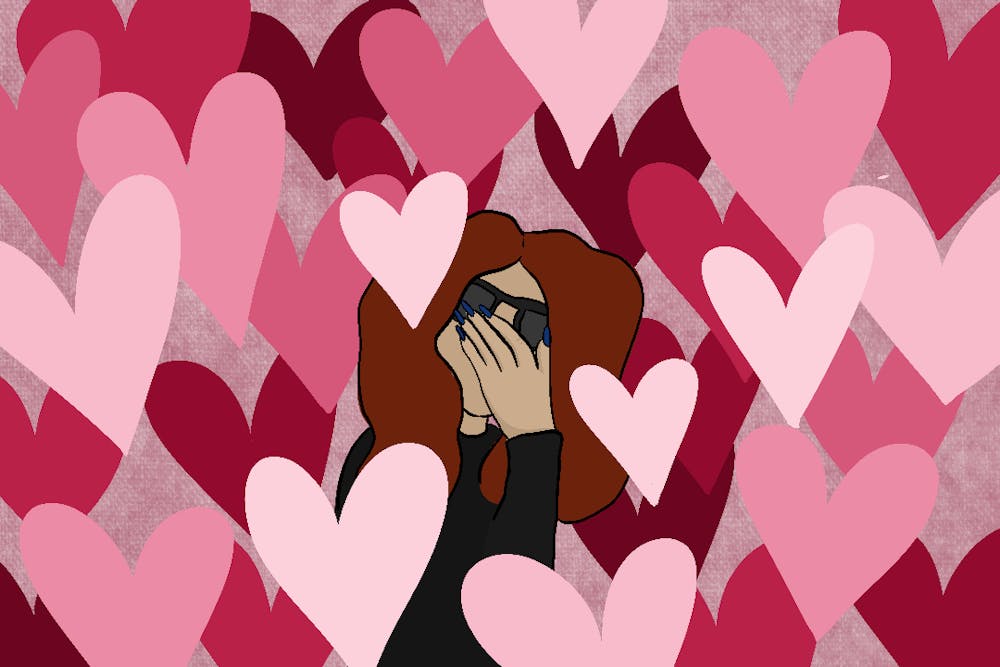Within hours of Amelia Dimoldenberg's interview with Andrew Garfield, social media was flooded with comments about their chemistry. But Chicken Shop Date fans know that that's just her interview style.
It can be easy to get lost in other people's lives in the digital world where information about a person is infinitely accessible. This can bring into question where to draw the line between harmless fun and harmful entertainment when fans immerse themselves in the lives of others.
"People's expectations of what is harmful and what is harmless are very much structured by your past experiences, cultural experiences, personal ethical norms, social group and your religious or nonreligious ethical viewpoints," said Stephen Carradini, an associate professor of technical communication for the College of Integrative Sciences and Arts.
The boundaries that are established between the public figure and their supporters can determine if the actions of the supporters are appropriate. They can sometimes overstep a boundary where they insert themselves in the celebrity or influencers' lives.
Carradini explains that Social media may spark a parasocial relationship between the influencer and their supporters.
READ MORE: Fandom or obsession: The complicated reality of parasocial relationships
"You can feel like you really know someone, and they can not know your name at all," said Carradini. "So there's this sort of simulated relationship where someone feels like they have intimate knowledge and access, understanding and awareness and even a friendship with this person."
As a result of this simulated connection, supporters will ship certain influencers or celebrities with one another because they feel as though they see a connection between the two even if that "connection" can be a PR tactic or clickbait.
Kylie Hundley, a sophomore studying criminology criminal justice, described how it can be fun for people to speculate what is going on in influencers' or celebrities' lives because of the resulting entertainment and drama.
"Before (famous) people would go out and people would speculate and no one would talk about it, but with social media people feel like they have the right to talk about it, and ship other people, but they don't," Hundley said.
An example of this can be seen in the Chicken Shop Date with influencer Dimoldenberg, where she invites various celebrities on her platform and converses with them while they enjoy a meal.
The conversations are usually very casual and sometimes you can see this "flirty persona" of Dimoldenberg with certain celebrities such as Jack Harlow, Andrew Garfield, or Paul Mescal. This persona can often lead the internet into a frenzy because they want Dimoldenberg to pursue romantic relationships with these celebrities because of the "chemistry" she showcases on camera.
Shawn Walker, an assistant professor at the School of Social and Behavioral Sciences, explained more about the intention behind images curated online.
"When we post things, we're curating our presence online," Walker said. "We're presenting a specific version of ourselves, and we do that offline too, a very specific version of ourselves."
Walker said we do the same with our relationships, and how we don't talk to our friends in the same way we may talk to our professors. Celebrities or influencers initially do the same thing, but do it at a bigger level — and in some cases — it is a big part of their careers.
We feel a connection with this presence because we resonate with it in some way. Whether that be the desire to be like them or have the things they have (or pretend they have).
In this case, it would be that dramatized chemistry shown on camera between two people; people love the idea of love, hence why romance movies are so popular and also why ship culture is so common, but it comes with its consequences.
Naomi Inegbenedion, a sophomore studying community health, explained how when people comment on celebrities' or influencers' personal lives or romantic relationships, it can become very toxic and take a toll on celebrities' lives.
"It stems from people's own personal opinions — jealousy can also play a part in this too where people feel like (a celebrity or influencer) does not deserve them because they feel like they should be with somebody else," Inegbenedion said.
Inegbedion brought up a recent situation between Skai Jackson and Deondre Burgin, where Burgin was bashed on the internet because Jackson's supporters felt like Burgin was not worthy enough of the Disney star. Similar internet behavior also occurred surrounding gold-medalist gymnast Simone Biles and her husband Jonathan Owens.
"We are not in their relationship, we do not know how things run so it isn't in our place to critique or say our opinions about it," Inegbenedion said.
Edited by Andrew Dirst, Sophia Braccio and Natalia Jarrett.
Reach the reporter at atlynch2@asu.edu and follow @alanamentions on X.
Like The State Press on Facebook and follow @statepress on X.




